CIPD 5ODT: Theories and Principles of Organization Development
VerifiedAdded on 2023/06/07
|9
|2011
|106
Report
AI Summary
This report delves into the origins, evolution, and contemporary definitions of Organization Development (OD), linking it to behavioral psychology, social and organizational learning theories, and organizational systems theory. It highlights key concepts such as action research, group dynamics, and the role of change agents. The report also discusses relevant behavioral psychology theories like Agency Theory and Complexity Theory, as well as organizational learning theories such as Systems Theory and Institutional Theory. It emphasizes the importance of multidisciplinary approaches, team collaboration, and technological advancements in fostering organizational development. The author reflects on how this knowledge can be applied in practice to design and implement effective OD strategies, overcome resistance to change, and promote a collaborative and synergistic approach to organizational improvement. This assignment solution is available on Desklib, a platform offering a wide range of academic resources for students.
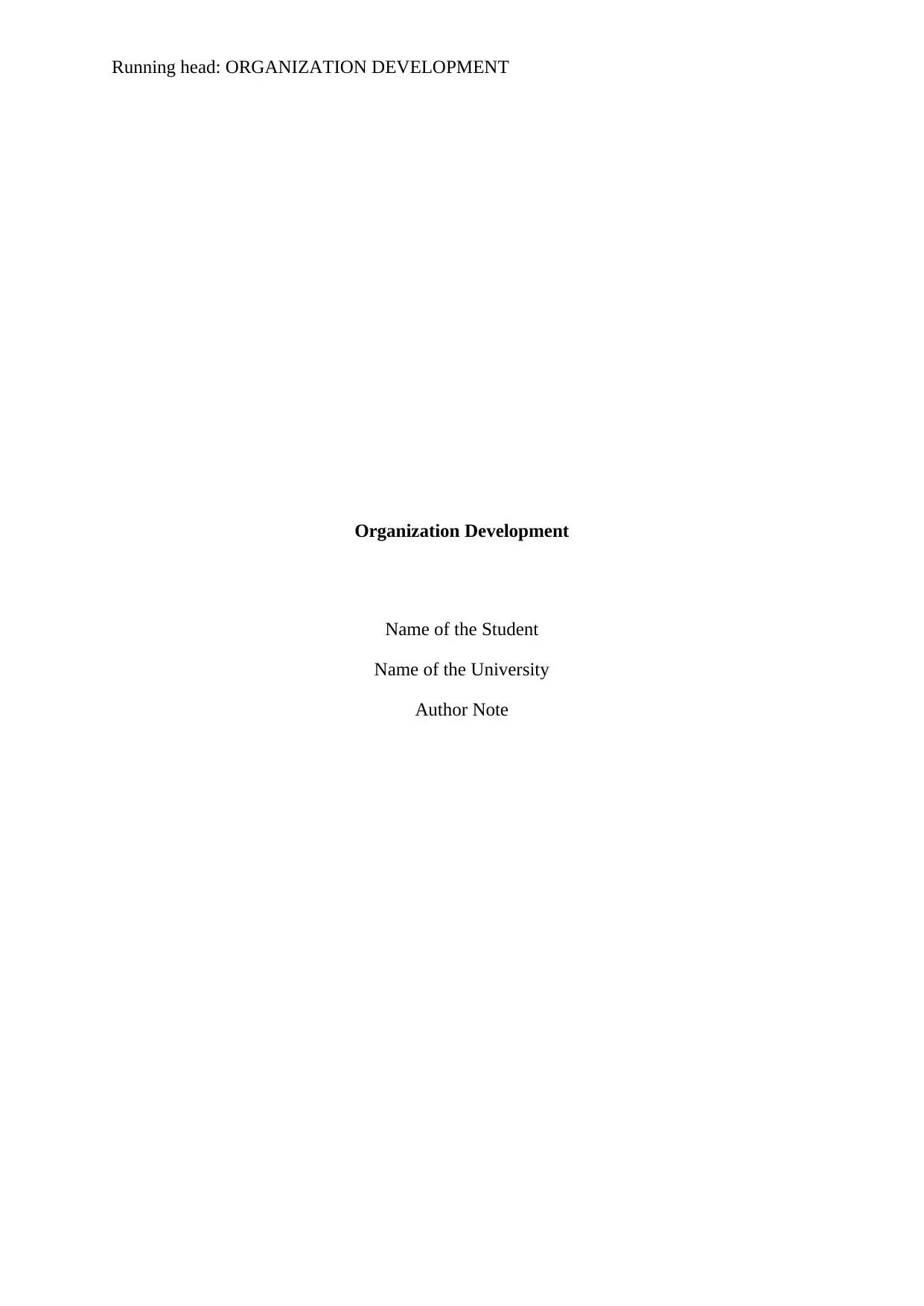
Running head: ORGANIZATION DEVELOPMENT
Organization Development
Name of the Student
Name of the University
Author Note
Organization Development
Name of the Student
Name of the University
Author Note
Paraphrase This Document
Need a fresh take? Get an instant paraphrase of this document with our AI Paraphraser
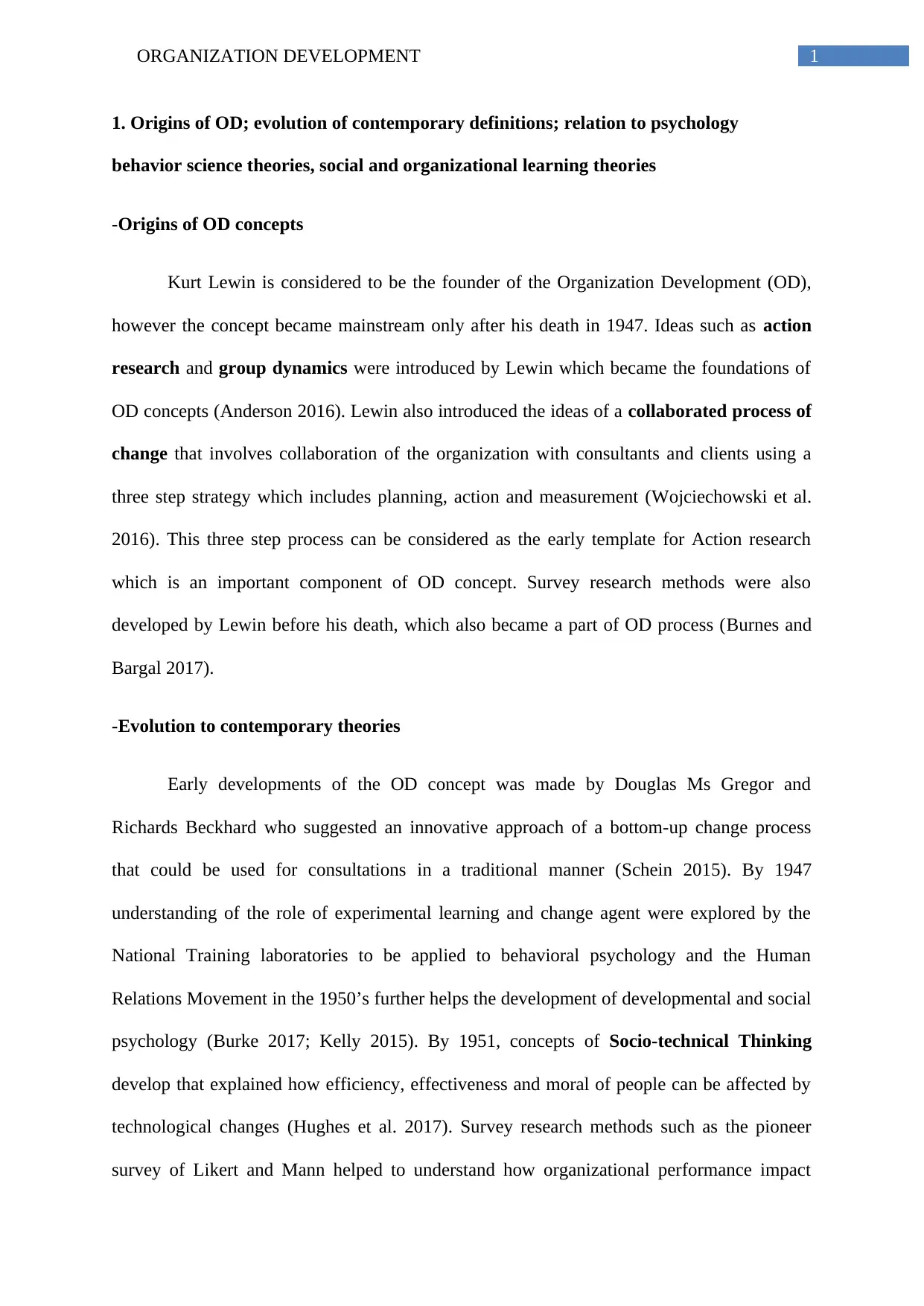
1ORGANIZATION DEVELOPMENT
1. Origins of OD; evolution of contemporary definitions; relation to psychology
behavior science theories, social and organizational learning theories
-Origins of OD concepts
Kurt Lewin is considered to be the founder of the Organization Development (OD),
however the concept became mainstream only after his death in 1947. Ideas such as action
research and group dynamics were introduced by Lewin which became the foundations of
OD concepts (Anderson 2016). Lewin also introduced the ideas of a collaborated process of
change that involves collaboration of the organization with consultants and clients using a
three step strategy which includes planning, action and measurement (Wojciechowski et al.
2016). This three step process can be considered as the early template for Action research
which is an important component of OD concept. Survey research methods were also
developed by Lewin before his death, which also became a part of OD process (Burnes and
Bargal 2017).
-Evolution to contemporary theories
Early developments of the OD concept was made by Douglas Ms Gregor and
Richards Beckhard who suggested an innovative approach of a bottom-up change process
that could be used for consultations in a traditional manner (Schein 2015). By 1947
understanding of the role of experimental learning and change agent were explored by the
National Training laboratories to be applied to behavioral psychology and the Human
Relations Movement in the 1950’s further helps the development of developmental and social
psychology (Burke 2017; Kelly 2015). By 1951, concepts of Socio-technical Thinking
develop that explained how efficiency, effectiveness and moral of people can be affected by
technological changes (Hughes et al. 2017). Survey research methods such as the pioneer
survey of Likert and Mann helped to understand how organizational performance impact
1. Origins of OD; evolution of contemporary definitions; relation to psychology
behavior science theories, social and organizational learning theories
-Origins of OD concepts
Kurt Lewin is considered to be the founder of the Organization Development (OD),
however the concept became mainstream only after his death in 1947. Ideas such as action
research and group dynamics were introduced by Lewin which became the foundations of
OD concepts (Anderson 2016). Lewin also introduced the ideas of a collaborated process of
change that involves collaboration of the organization with consultants and clients using a
three step strategy which includes planning, action and measurement (Wojciechowski et al.
2016). This three step process can be considered as the early template for Action research
which is an important component of OD concept. Survey research methods were also
developed by Lewin before his death, which also became a part of OD process (Burnes and
Bargal 2017).
-Evolution to contemporary theories
Early developments of the OD concept was made by Douglas Ms Gregor and
Richards Beckhard who suggested an innovative approach of a bottom-up change process
that could be used for consultations in a traditional manner (Schein 2015). By 1947
understanding of the role of experimental learning and change agent were explored by the
National Training laboratories to be applied to behavioral psychology and the Human
Relations Movement in the 1950’s further helps the development of developmental and social
psychology (Burke 2017; Kelly 2015). By 1951, concepts of Socio-technical Thinking
develop that explained how efficiency, effectiveness and moral of people can be affected by
technological changes (Hughes et al. 2017). Survey research methods such as the pioneer
survey of Likert and Mann helped to understand how organizational performance impact
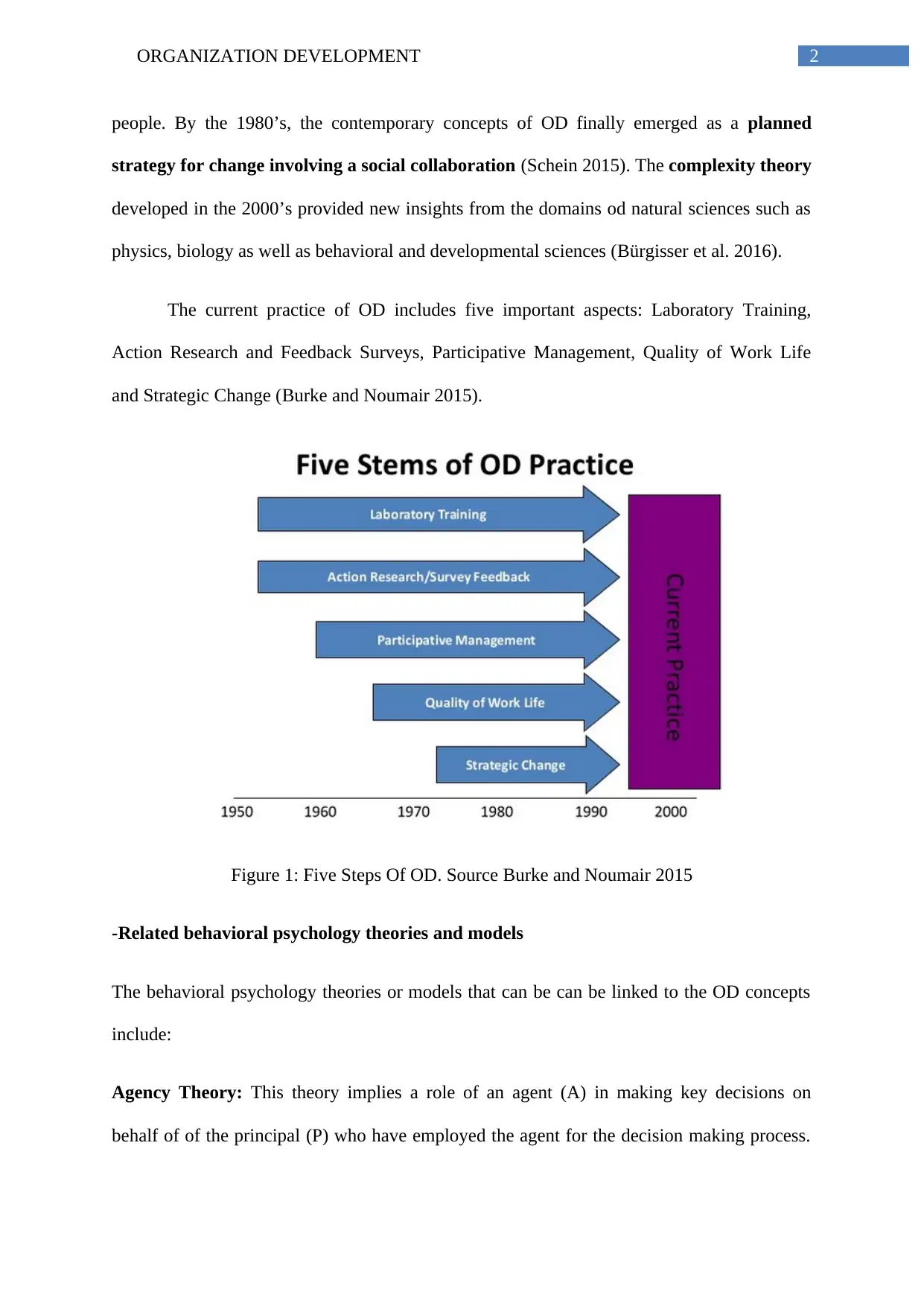
2ORGANIZATION DEVELOPMENT
people. By the 1980’s, the contemporary concepts of OD finally emerged as a planned
strategy for change involving a social collaboration (Schein 2015). The complexity theory
developed in the 2000’s provided new insights from the domains od natural sciences such as
physics, biology as well as behavioral and developmental sciences (Bürgisser et al. 2016).
The current practice of OD includes five important aspects: Laboratory Training,
Action Research and Feedback Surveys, Participative Management, Quality of Work Life
and Strategic Change (Burke and Noumair 2015).
Figure 1: Five Steps Of OD. Source Burke and Noumair 2015
-Related behavioral psychology theories and models
The behavioral psychology theories or models that can be can be linked to the OD concepts
include:
Agency Theory: This theory implies a role of an agent (A) in making key decisions on
behalf of of the principal (P) who have employed the agent for the decision making process.
people. By the 1980’s, the contemporary concepts of OD finally emerged as a planned
strategy for change involving a social collaboration (Schein 2015). The complexity theory
developed in the 2000’s provided new insights from the domains od natural sciences such as
physics, biology as well as behavioral and developmental sciences (Bürgisser et al. 2016).
The current practice of OD includes five important aspects: Laboratory Training,
Action Research and Feedback Surveys, Participative Management, Quality of Work Life
and Strategic Change (Burke and Noumair 2015).
Figure 1: Five Steps Of OD. Source Burke and Noumair 2015
-Related behavioral psychology theories and models
The behavioral psychology theories or models that can be can be linked to the OD concepts
include:
Agency Theory: This theory implies a role of an agent (A) in making key decisions on
behalf of of the principal (P) who have employed the agent for the decision making process.
⊘ This is a preview!⊘
Do you want full access?
Subscribe today to unlock all pages.

Trusted by 1+ million students worldwide
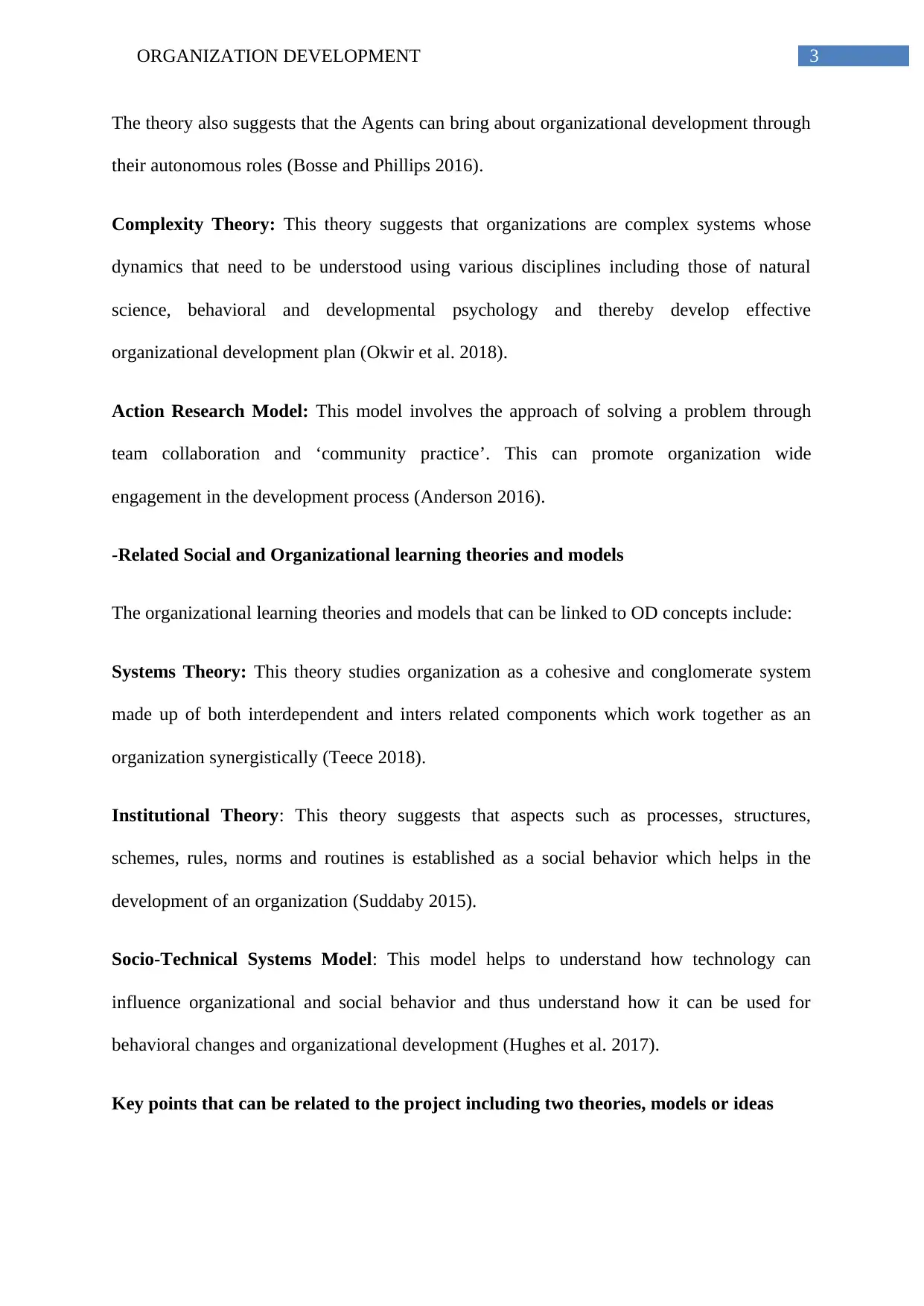
3ORGANIZATION DEVELOPMENT
The theory also suggests that the Agents can bring about organizational development through
their autonomous roles (Bosse and Phillips 2016).
Complexity Theory: This theory suggests that organizations are complex systems whose
dynamics that need to be understood using various disciplines including those of natural
science, behavioral and developmental psychology and thereby develop effective
organizational development plan (Okwir et al. 2018).
Action Research Model: This model involves the approach of solving a problem through
team collaboration and ‘community practice’. This can promote organization wide
engagement in the development process (Anderson 2016).
-Related Social and Organizational learning theories and models
The organizational learning theories and models that can be linked to OD concepts include:
Systems Theory: This theory studies organization as a cohesive and conglomerate system
made up of both interdependent and inters related components which work together as an
organization synergistically (Teece 2018).
Institutional Theory: This theory suggests that aspects such as processes, structures,
schemes, rules, norms and routines is established as a social behavior which helps in the
development of an organization (Suddaby 2015).
Socio-Technical Systems Model: This model helps to understand how technology can
influence organizational and social behavior and thus understand how it can be used for
behavioral changes and organizational development (Hughes et al. 2017).
Key points that can be related to the project including two theories, models or ideas
The theory also suggests that the Agents can bring about organizational development through
their autonomous roles (Bosse and Phillips 2016).
Complexity Theory: This theory suggests that organizations are complex systems whose
dynamics that need to be understood using various disciplines including those of natural
science, behavioral and developmental psychology and thereby develop effective
organizational development plan (Okwir et al. 2018).
Action Research Model: This model involves the approach of solving a problem through
team collaboration and ‘community practice’. This can promote organization wide
engagement in the development process (Anderson 2016).
-Related Social and Organizational learning theories and models
The organizational learning theories and models that can be linked to OD concepts include:
Systems Theory: This theory studies organization as a cohesive and conglomerate system
made up of both interdependent and inters related components which work together as an
organization synergistically (Teece 2018).
Institutional Theory: This theory suggests that aspects such as processes, structures,
schemes, rules, norms and routines is established as a social behavior which helps in the
development of an organization (Suddaby 2015).
Socio-Technical Systems Model: This model helps to understand how technology can
influence organizational and social behavior and thus understand how it can be used for
behavioral changes and organizational development (Hughes et al. 2017).
Key points that can be related to the project including two theories, models or ideas
Paraphrase This Document
Need a fresh take? Get an instant paraphrase of this document with our AI Paraphraser
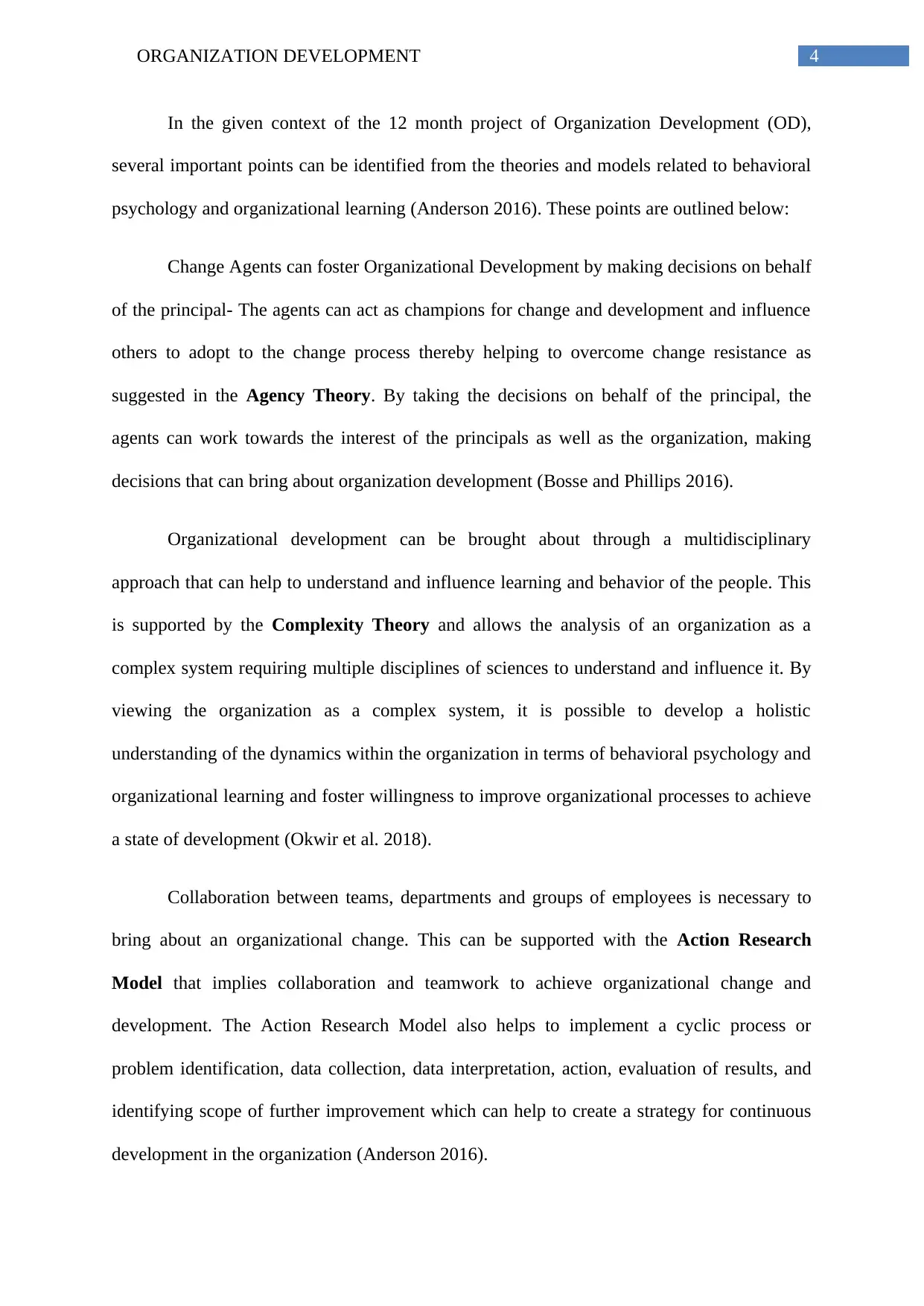
4ORGANIZATION DEVELOPMENT
In the given context of the 12 month project of Organization Development (OD),
several important points can be identified from the theories and models related to behavioral
psychology and organizational learning (Anderson 2016). These points are outlined below:
Change Agents can foster Organizational Development by making decisions on behalf
of the principal- The agents can act as champions for change and development and influence
others to adopt to the change process thereby helping to overcome change resistance as
suggested in the Agency Theory. By taking the decisions on behalf of the principal, the
agents can work towards the interest of the principals as well as the organization, making
decisions that can bring about organization development (Bosse and Phillips 2016).
Organizational development can be brought about through a multidisciplinary
approach that can help to understand and influence learning and behavior of the people. This
is supported by the Complexity Theory and allows the analysis of an organization as a
complex system requiring multiple disciplines of sciences to understand and influence it. By
viewing the organization as a complex system, it is possible to develop a holistic
understanding of the dynamics within the organization in terms of behavioral psychology and
organizational learning and foster willingness to improve organizational processes to achieve
a state of development (Okwir et al. 2018).
Collaboration between teams, departments and groups of employees is necessary to
bring about an organizational change. This can be supported with the Action Research
Model that implies collaboration and teamwork to achieve organizational change and
development. The Action Research Model also helps to implement a cyclic process or
problem identification, data collection, data interpretation, action, evaluation of results, and
identifying scope of further improvement which can help to create a strategy for continuous
development in the organization (Anderson 2016).
In the given context of the 12 month project of Organization Development (OD),
several important points can be identified from the theories and models related to behavioral
psychology and organizational learning (Anderson 2016). These points are outlined below:
Change Agents can foster Organizational Development by making decisions on behalf
of the principal- The agents can act as champions for change and development and influence
others to adopt to the change process thereby helping to overcome change resistance as
suggested in the Agency Theory. By taking the decisions on behalf of the principal, the
agents can work towards the interest of the principals as well as the organization, making
decisions that can bring about organization development (Bosse and Phillips 2016).
Organizational development can be brought about through a multidisciplinary
approach that can help to understand and influence learning and behavior of the people. This
is supported by the Complexity Theory and allows the analysis of an organization as a
complex system requiring multiple disciplines of sciences to understand and influence it. By
viewing the organization as a complex system, it is possible to develop a holistic
understanding of the dynamics within the organization in terms of behavioral psychology and
organizational learning and foster willingness to improve organizational processes to achieve
a state of development (Okwir et al. 2018).
Collaboration between teams, departments and groups of employees is necessary to
bring about an organizational change. This can be supported with the Action Research
Model that implies collaboration and teamwork to achieve organizational change and
development. The Action Research Model also helps to implement a cyclic process or
problem identification, data collection, data interpretation, action, evaluation of results, and
identifying scope of further improvement which can help to create a strategy for continuous
development in the organization (Anderson 2016).
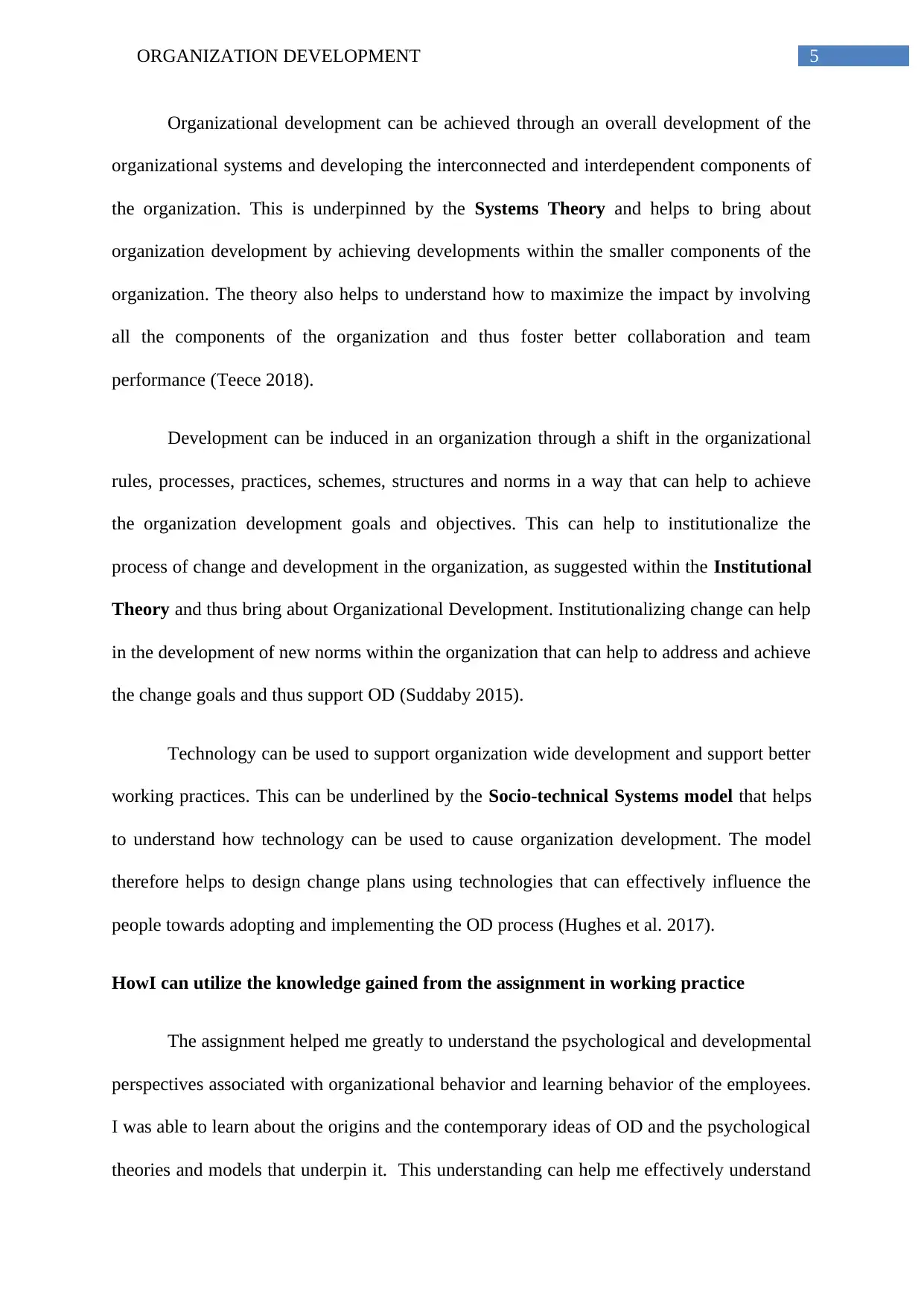
5ORGANIZATION DEVELOPMENT
Organizational development can be achieved through an overall development of the
organizational systems and developing the interconnected and interdependent components of
the organization. This is underpinned by the Systems Theory and helps to bring about
organization development by achieving developments within the smaller components of the
organization. The theory also helps to understand how to maximize the impact by involving
all the components of the organization and thus foster better collaboration and team
performance (Teece 2018).
Development can be induced in an organization through a shift in the organizational
rules, processes, practices, schemes, structures and norms in a way that can help to achieve
the organization development goals and objectives. This can help to institutionalize the
process of change and development in the organization, as suggested within the Institutional
Theory and thus bring about Organizational Development. Institutionalizing change can help
in the development of new norms within the organization that can help to address and achieve
the change goals and thus support OD (Suddaby 2015).
Technology can be used to support organization wide development and support better
working practices. This can be underlined by the Socio-technical Systems model that helps
to understand how technology can be used to cause organization development. The model
therefore helps to design change plans using technologies that can effectively influence the
people towards adopting and implementing the OD process (Hughes et al. 2017).
HowI can utilize the knowledge gained from the assignment in working practice
The assignment helped me greatly to understand the psychological and developmental
perspectives associated with organizational behavior and learning behavior of the employees.
I was able to learn about the origins and the contemporary ideas of OD and the psychological
theories and models that underpin it. This understanding can help me effectively understand
Organizational development can be achieved through an overall development of the
organizational systems and developing the interconnected and interdependent components of
the organization. This is underpinned by the Systems Theory and helps to bring about
organization development by achieving developments within the smaller components of the
organization. The theory also helps to understand how to maximize the impact by involving
all the components of the organization and thus foster better collaboration and team
performance (Teece 2018).
Development can be induced in an organization through a shift in the organizational
rules, processes, practices, schemes, structures and norms in a way that can help to achieve
the organization development goals and objectives. This can help to institutionalize the
process of change and development in the organization, as suggested within the Institutional
Theory and thus bring about Organizational Development. Institutionalizing change can help
in the development of new norms within the organization that can help to address and achieve
the change goals and thus support OD (Suddaby 2015).
Technology can be used to support organization wide development and support better
working practices. This can be underlined by the Socio-technical Systems model that helps
to understand how technology can be used to cause organization development. The model
therefore helps to design change plans using technologies that can effectively influence the
people towards adopting and implementing the OD process (Hughes et al. 2017).
HowI can utilize the knowledge gained from the assignment in working practice
The assignment helped me greatly to understand the psychological and developmental
perspectives associated with organizational behavior and learning behavior of the employees.
I was able to learn about the origins and the contemporary ideas of OD and the psychological
theories and models that underpin it. This understanding can help me effectively understand
⊘ This is a preview!⊘
Do you want full access?
Subscribe today to unlock all pages.

Trusted by 1+ million students worldwide
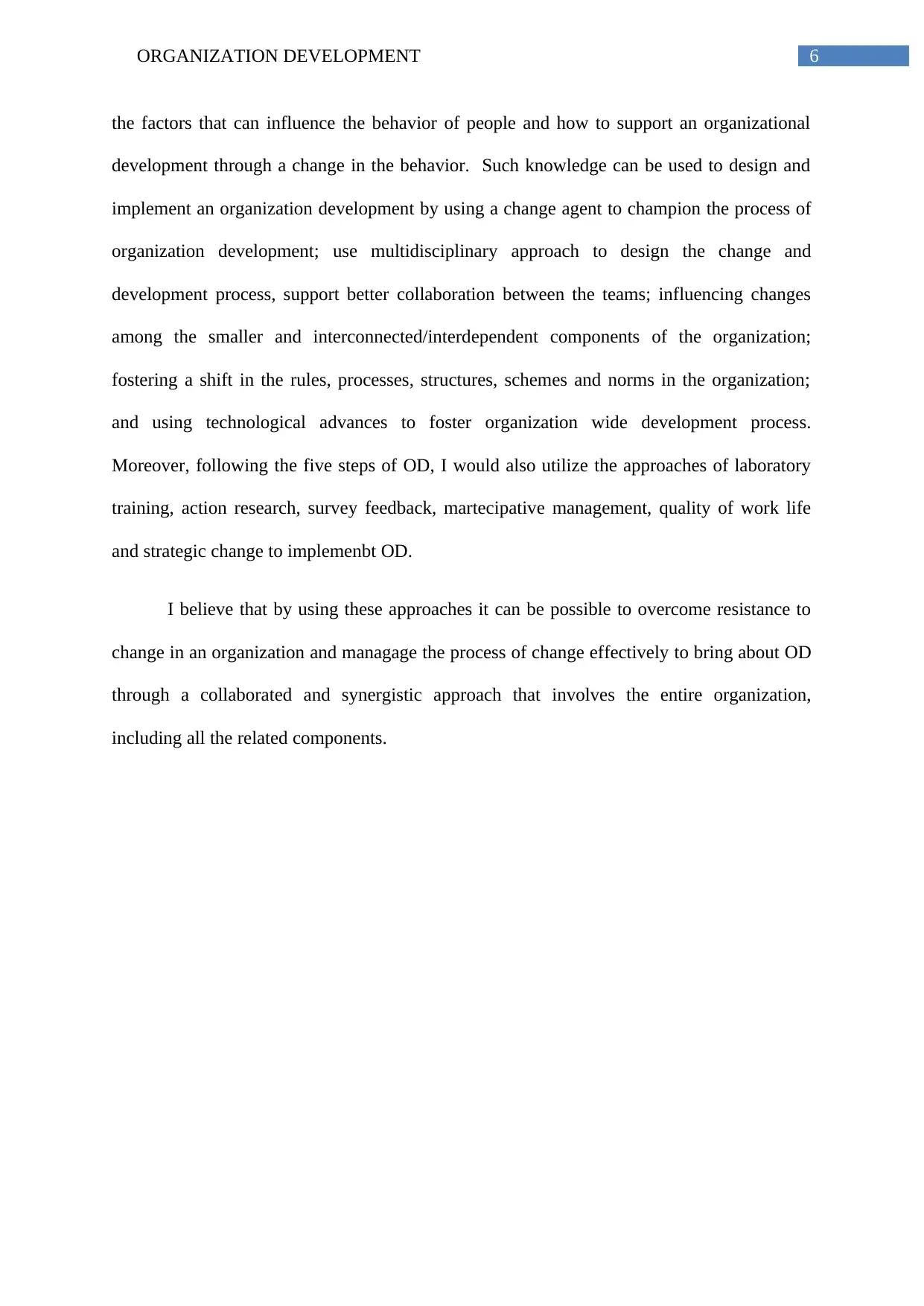
6ORGANIZATION DEVELOPMENT
the factors that can influence the behavior of people and how to support an organizational
development through a change in the behavior. Such knowledge can be used to design and
implement an organization development by using a change agent to champion the process of
organization development; use multidisciplinary approach to design the change and
development process, support better collaboration between the teams; influencing changes
among the smaller and interconnected/interdependent components of the organization;
fostering a shift in the rules, processes, structures, schemes and norms in the organization;
and using technological advances to foster organization wide development process.
Moreover, following the five steps of OD, I would also utilize the approaches of laboratory
training, action research, survey feedback, martecipative management, quality of work life
and strategic change to implemenbt OD.
I believe that by using these approaches it can be possible to overcome resistance to
change in an organization and managage the process of change effectively to bring about OD
through a collaborated and synergistic approach that involves the entire organization,
including all the related components.
the factors that can influence the behavior of people and how to support an organizational
development through a change in the behavior. Such knowledge can be used to design and
implement an organization development by using a change agent to champion the process of
organization development; use multidisciplinary approach to design the change and
development process, support better collaboration between the teams; influencing changes
among the smaller and interconnected/interdependent components of the organization;
fostering a shift in the rules, processes, structures, schemes and norms in the organization;
and using technological advances to foster organization wide development process.
Moreover, following the five steps of OD, I would also utilize the approaches of laboratory
training, action research, survey feedback, martecipative management, quality of work life
and strategic change to implemenbt OD.
I believe that by using these approaches it can be possible to overcome resistance to
change in an organization and managage the process of change effectively to bring about OD
through a collaborated and synergistic approach that involves the entire organization,
including all the related components.
Paraphrase This Document
Need a fresh take? Get an instant paraphrase of this document with our AI Paraphraser
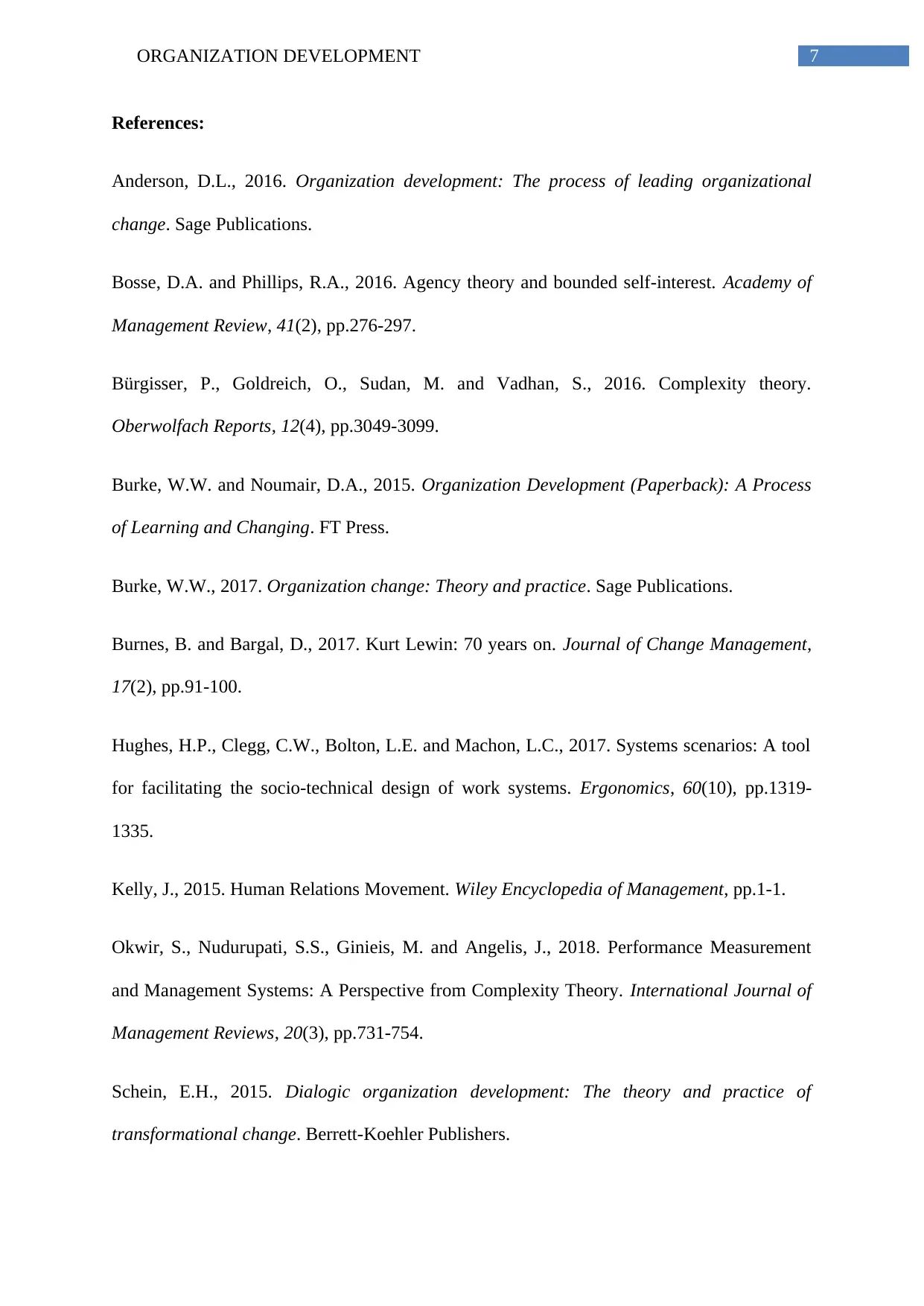
7ORGANIZATION DEVELOPMENT
References:
Anderson, D.L., 2016. Organization development: The process of leading organizational
change. Sage Publications.
Bosse, D.A. and Phillips, R.A., 2016. Agency theory and bounded self-interest. Academy of
Management Review, 41(2), pp.276-297.
Bürgisser, P., Goldreich, O., Sudan, M. and Vadhan, S., 2016. Complexity theory.
Oberwolfach Reports, 12(4), pp.3049-3099.
Burke, W.W. and Noumair, D.A., 2015. Organization Development (Paperback): A Process
of Learning and Changing. FT Press.
Burke, W.W., 2017. Organization change: Theory and practice. Sage Publications.
Burnes, B. and Bargal, D., 2017. Kurt Lewin: 70 years on. Journal of Change Management,
17(2), pp.91-100.
Hughes, H.P., Clegg, C.W., Bolton, L.E. and Machon, L.C., 2017. Systems scenarios: A tool
for facilitating the socio-technical design of work systems. Ergonomics, 60(10), pp.1319-
1335.
Kelly, J., 2015. Human Relations Movement. Wiley Encyclopedia of Management, pp.1-1.
Okwir, S., Nudurupati, S.S., Ginieis, M. and Angelis, J., 2018. Performance Measurement
and Management Systems: A Perspective from Complexity Theory. International Journal of
Management Reviews, 20(3), pp.731-754.
Schein, E.H., 2015. Dialogic organization development: The theory and practice of
transformational change. Berrett-Koehler Publishers.
References:
Anderson, D.L., 2016. Organization development: The process of leading organizational
change. Sage Publications.
Bosse, D.A. and Phillips, R.A., 2016. Agency theory and bounded self-interest. Academy of
Management Review, 41(2), pp.276-297.
Bürgisser, P., Goldreich, O., Sudan, M. and Vadhan, S., 2016. Complexity theory.
Oberwolfach Reports, 12(4), pp.3049-3099.
Burke, W.W. and Noumair, D.A., 2015. Organization Development (Paperback): A Process
of Learning and Changing. FT Press.
Burke, W.W., 2017. Organization change: Theory and practice. Sage Publications.
Burnes, B. and Bargal, D., 2017. Kurt Lewin: 70 years on. Journal of Change Management,
17(2), pp.91-100.
Hughes, H.P., Clegg, C.W., Bolton, L.E. and Machon, L.C., 2017. Systems scenarios: A tool
for facilitating the socio-technical design of work systems. Ergonomics, 60(10), pp.1319-
1335.
Kelly, J., 2015. Human Relations Movement. Wiley Encyclopedia of Management, pp.1-1.
Okwir, S., Nudurupati, S.S., Ginieis, M. and Angelis, J., 2018. Performance Measurement
and Management Systems: A Perspective from Complexity Theory. International Journal of
Management Reviews, 20(3), pp.731-754.
Schein, E.H., 2015. Dialogic organization development: The theory and practice of
transformational change. Berrett-Koehler Publishers.
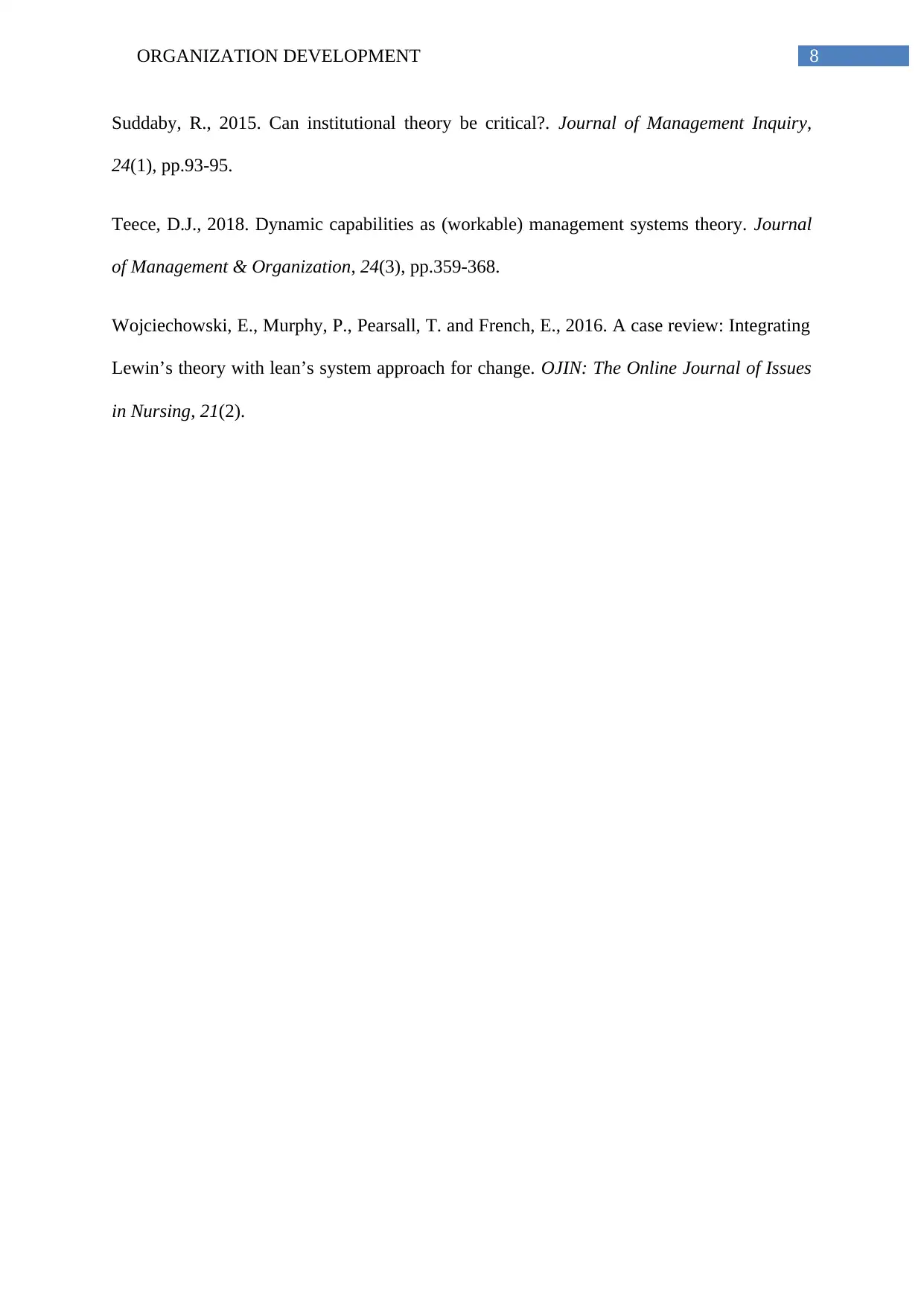
8ORGANIZATION DEVELOPMENT
Suddaby, R., 2015. Can institutional theory be critical?. Journal of Management Inquiry,
24(1), pp.93-95.
Teece, D.J., 2018. Dynamic capabilities as (workable) management systems theory. Journal
of Management & Organization, 24(3), pp.359-368.
Wojciechowski, E., Murphy, P., Pearsall, T. and French, E., 2016. A case review: Integrating
Lewin’s theory with lean’s system approach for change. OJIN: The Online Journal of Issues
in Nursing, 21(2).
Suddaby, R., 2015. Can institutional theory be critical?. Journal of Management Inquiry,
24(1), pp.93-95.
Teece, D.J., 2018. Dynamic capabilities as (workable) management systems theory. Journal
of Management & Organization, 24(3), pp.359-368.
Wojciechowski, E., Murphy, P., Pearsall, T. and French, E., 2016. A case review: Integrating
Lewin’s theory with lean’s system approach for change. OJIN: The Online Journal of Issues
in Nursing, 21(2).
⊘ This is a preview!⊘
Do you want full access?
Subscribe today to unlock all pages.

Trusted by 1+ million students worldwide
1 out of 9
Related Documents
Your All-in-One AI-Powered Toolkit for Academic Success.
+13062052269
info@desklib.com
Available 24*7 on WhatsApp / Email
![[object Object]](/_next/static/media/star-bottom.7253800d.svg)
Unlock your academic potential
Copyright © 2020–2026 A2Z Services. All Rights Reserved. Developed and managed by ZUCOL.





